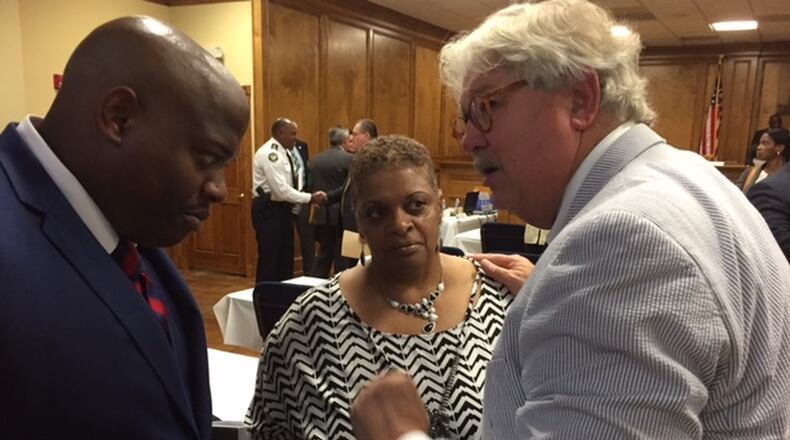Georgia’s police oversight agency on Wednesday voted to revoke the certification of a former Union City officer who shot an unarmed teen in the back and later lied about the incident to another agency.
Luther Lewis will have a month to appeal the decision by the Georgia Peace Officer Standards and Training Council (POST). An Atlanta Journal-Constitution/Channel 2 Action News investigation into the 2011 fatal shooting death of Ariston Waiters raised new questions about the case last year and revealed two prior incidents where fellow officers said Lewis lied. His case was reopened last May after the AJC and Channel 2 reported new evidence.
Lewis was untruthful about the shooting when he applied for a police job at the Savannah airport last summer. He was terminated from that position last July when senior leaders in the department learned that he had misled them about the 2011 case. POST opened its investigation after the Savannah agency reported the termination.
Freda Waiters, Waiters’ mother, said POST’s action does not absolve the death of her son. She said she was relieved that Lewis will no longer be a police officer in Georgia.
“I wouldn’t wish this nightmare on anybody,” she said. “This makes the streets (safer) with him off the streets….The truth of the matter is he lied to the grand jury. He’s been lying all along. He’s been falsifying information with the cover-up. He’s been able to get away with it.”
Lewis did not return a phone message on Wednesday and has declined repeated requests for interviews dating back to May 2015. POST director Ken Vance declined to comment Wednesday, but last year said the body regards lying by police officers as a serious infraction.
“Your credibility is destroyed on the stand from then on,” he said at the time.
Waiters, who was black, was unarmed. The 19-year-old ran when police arrived in December 2011 to break up a neighborhood fight he’d been watching, and was already lying face down on the ground with one arm handcuffed when Lewis shot him twice in the back. The teen hadn’t committed a crime.
Lewis told Georgia Bureau of Investigation agents who reviewed the shooting that Waiters grabbed his gun. But a Union City supervising lieutenant who had never been interviewed by the GBI broke a three-year silence and told reporters that Lewis recounted a different story the night of the shooting. Lewis didn’t mention to him anything about a struggle for his gun.
Lewis’ testimony was critical in two separate grand juries that cleared him of shooting Waiters. He gave an emotional closing statement to a Fulton County grand jury before it voted to clear him in May 2012. After the case was reopened last May, Fulton County District Attorney Paul Howard’s brought the case to a second grand jury in August. Lewis again gave a lengthy, emotional statement to grand jurors, who again voted to clear him.
At the time, Howard’s office was unaware that Lewis, who is white, had been terminated from a new job at the Savannah Airport Commission for lying on his job application two weeks earlier, and he did not present that fact to grand jurors.
Howard believes Lewis committed a crime in the case. He said the officer’s emotional statements to both grand juries may have trumped the facts.
The decisions of grand jurors in both 2012 and 2015 were consistent with what the AJC/Channel 2 investigation found when reporters reviewed six years of police shootings. Between 2010 and 2015, 184 people were shot and killed by the police in Georgia. No officer faced criminal prosecution in those shootings, even in instances when videotape or eyewitness evidence raised serious questions about the shooting. (An officer was indicted in January after the series was published.)
In April, Governor Nathan Deal signed into law a grand jury reform bill that proponents say will make the process more fair in police shooting cases. Officers will no longer be allowed to sit in on the entire grand jury process, listen to all the evidence against them and make a statement at the end that can’t be challenged or questioned by prosecutors or grand jurors.
The new law, which takes effect July 1, will still allow officers to make a statement to grand jurors, but they will now be subject to cross-examination. Georgia was the only state that had such favorable grand jury rules for officers facing potential criminal charges.
Read more about the fatal shooting of Ariston Waiters on AJC.com at investigations.ajc.com/overtheline/.
About the Author
The Latest
Featured



